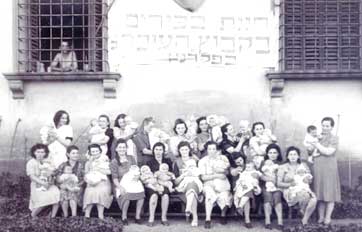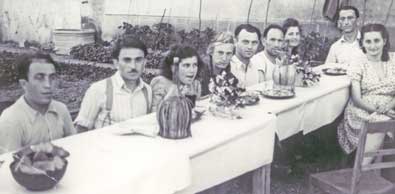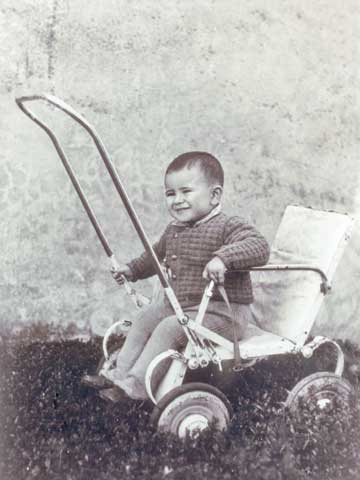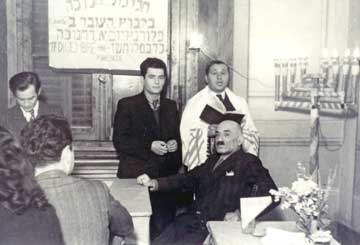A little background:1943: Italy: During World War II, Sicily was the scene of heavy fighting. The Allies launched an invasion from North African bases on July 9-10, 1943. Patton landed forces at Licata and Gela and Montgomery landed at several places south of Syracuse. By the end of the year, the Fascists (those who supported Mussolini between 1922-1943) were overthrown and Italy joined the Allies. The Nazis still held central and northern Italy.
1945: New nation of Italy is formed. https://history.state.gov
Sicily becomes one of five autonomous regions (1946). A new constitution adopted in 1947.
1949: Italy joins the NATO alliance. https://history.state.gov
http://history.howstuffworks.com
25 camps in 1948, some listed here. If you have any camps or information to add, e-mail me.
DP camps Library of Congress - http://library.cqpress.com
UN Archives - boxes and identification- https://archives.un.org
Adriatic - http://www.ushmm.org
Aprica
prison
Asti
Transit camp: Deporttion camp for politican prisoners and Jews
Bagnoli now has its own page. - Hungarians, Ukrainians;
Bari Transit
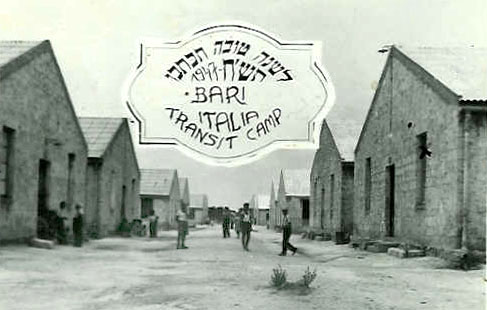 Photo at left submitted by Elie Lewinger
Photo at left submitted by Elie Lewinger
Archives: ARCHIVIO DI STATO DI BARI
Via L. Bissolati 3
70125 Bari
ITALIA
phone: 080 502 4860
fax: 080 502 4870
http://www.archiviodistatodibari.beniculturali.it/
Jun 5, 2018: Dear Olga,
I wrote you 5 years ago and I searched for my grandfather Danilo Jaksic. Last we heard from him from Eboli and unfortunatelly he died in 1946 and was burried near Eboli in Battipaglia. e.g. small place Montecorvino close to Eboli Camp. Those died in camp were mainly Serbians and Croats (member of Yugoslav Kindom Army and their familly members) after some time this cemetery was moved somewhere in Bari, close to San Nicola Church (south Italy) but I still search for exact location. If by the case someone has some more information about exact location I will appreciate it very much. Thank you,
Sincerely, Nenad Jaksic [email protected]
Barletta near Trani - See Bari archives above. Lt. Proczka, another of Warsaw's men in Italy, wrote to his superiors complaining about the treatment of possible repatriates in DP camps at Barletta and Trani that were run by the Polish 2nd Corps. Men from the Corps were using pressure to discourage return. In particular, posters had been put up all over the camp showing a mouse in Italy looking at a mousetrap in Poland. Since the camp had been "hermetically sealed off" by Anders' men, so only their views were being put forward. Proczka also complained that the UNRRA camp at Bari and the repatriation camp at Regio Emilia were also under the influence of Anders. He complained that special hit squads were coming from Bologna and Modena to work on those who might be wavering. [32] History of the Polish Army
10/6/04 Dear Olga,
I'm looking for news about DP CAMP in Barletta (Bari) during Second World War. Can you help me? thank you Angelo Torre
11/3/04 Hello Olga,
My parents and grandparents weren't in a DP camp in Judenburg. They were actually living with farmers whose sons were fighting the war for the Nazis. It is fascinating, however, to know that there were DP camps there. When my parents were "freed" from Judenburg in 1945 they were taken to Italy, eventually ending up in a DP camp in Barletta. My father enlisted in the Polish army under British command (Anders army), while my mother and her family lived in the DP camp. We have photos from that period. My parents were married in Barletta in 1945 and I was born in Trani in an army hospital in 1946. My grandfather was the head representative for the camp. His name was Stanislaw Czurylo.
I cannot tell you how thrilled I am to find your website. Thank you so much for suggesting the Austrian Archives. I will let you know what I find out. I am researching my family's WW II history with the objective of writing a book. Jane Hikel Coordinator, Writing Center,
English Department, Central Connecticut State University
Bologna
DP Univ. of Slavs, Balts, converted railroad workers' building housed student DPs BOLOGNA, IMOLA
Archivio di Stato di Bologna
Piazza Celestini 4
40123 Bologna
ITALIA
phone: 051 22 3891 or 051 23 9590
fax: 051 22 0474
Bolzano
Transit camp: Deporttion camp for politican prisoners and Jews; July 1944 - April 1945;
Chieti
prison
Cinecittà - http://www.ushmm.org
I am trying to find out a missing piece of my history. My family and I were housed in 2 DP Camps in Italy after WW2. My father was Hungarian and my mother Bulgarian, and I was born in Bulgaria in 1939. We had to leave Bulgaria at the end of the war, and ended in Italy, under the
auspices of IRO, the International Refugee Organization, which was named UNRRA before that....We stayed at Cinecitta DP Camp, then were sent to Bagnioli DP Camp, from there we were sent to a camp in Germany, the name of which I am trying to find out.
We stayed at that DP Camp for a short time, and then boarded the US NS GENERAL M.B. STEWART, from Bremenhaven, Germany, on Dec. 20th 1951, and arrived in N.Y., N.Y. on Jan. 2, 1952, The escort Officer was Lt. Crl. (Ret) A. Duncan Johnstone, MBE. ED....is there anyway to find out the name of the German DP Camp? I have the entire ship manifest of all the passengers (all DP's) my family is listed as "stateless", any info you can help me with would be appreciated. Thank you Anna Lewis [email protected] Soldotna, Alaska
Corrapoli
Transit camp: Deporttion camp for politican prisoners and Jews
Colonia Umberto 1 di Tonezzi
Transit camp: Deporttion camp for politican prisoners and Jews
Cremona - http://www.ushmm.org was one of the largest DP camps in Northern Italy and house 1,000 - 1,200 refugees in 1945-7. It closed in 1947. DPs lived in a schoolhouse.
Nov 26, 2013 Hi Olga
I finally got my father to write a bit about his life.
He mentioned that he spent some time in a refugee camp in Cremona Italy in the later stages of 1957.
I came across your site but could not find any info on that camp.
He is Croatian and he escaped from Yugoslavia to Ancona (Italy) before being transferred to Cremona.
Do you have any info on that camp in Cremona?
Regards
Edward Kovacev [email protected]
Eboli
Footage 1944 - http://www.criticalpast.com
Book: Christ Stopped at Eboli (Italian: Cristo si e fermato a Eboli) is a memoir by Carlo Levi, published in 1945, giving an account of his exile from 1935-1936 to Grassano and Aliano, remote towns in southern Italy, in the region of Lucania which is known today as Basilicata. In the book he gives Aliano the invented name 'Gagliano'.
"The title of the book comes from an expression by the people of 'Gagliano' who say of themselves, 'Christ stopped short of here, at Eboli' which means, in effect, that they feel they have been bypassed by Christianity, by morality, by history itself—that they have somehow been excluded from the full human experience." Levi explained that Eboli, a location in the region of Campania to the west near the seacoast, is where the road and railway to Basilicata branched away from the
Feb 15, 2014
Dear Olga,
There is a new book with lots of information about the DP camp of Eboli, Italy 1945 -1947. Although it was publlshed in Australia, payment via paypal and transport was no problem. Really a recommandation. There also is a list with the names of all the people who died in the camp. My grandmother is on there, too.
Book: "After World War II the town of Eboli in southern Italy was the site of one of the largest refugee camps, housing members of the Royal Yugoslav Army and their families. Eboli Camp 1945-1947 a photographic history, records everyday life in this camp of 14,000 inhabitants." http://books.google.com
Also titled: Eboli Logor 1945-1947 =? Eboli Camp 1945-1947 : u fotogrijama =? a photographic history /?
Nikola Lukich and Stavrophor Sasa Radoic?ic´.
CAMP EBOLI / By Stevan Pirocanac September 2015:
http://www.generalmihailovich.com
Emilia- See Regio
Fabriano near Ancona
Prison
Fermo near Ancona, Croatians
Archives: Archivio di Stato di Ascoli Piceno
Via S. Serafino da Montegranaro 8c
63100 Ascoli Piceno
ITALIA
phone: 073 625 3881
fax: 073 625 3881
Ferramonte
Transit and internment camp: established June 1940; 2000 prisoners, 500 of them were women; Liberated 8 Sept '43.
British POWs. After liberation, this camp served as a deportation camp for political prisoners and Jews. First arrival of Jews in Dec. 43. On 22 Feb 44 the first transport of Jewish deportees left for Germany. The next transports left on 5. April '44, 16 May '44, 26 June '44, the last on 1 Aug.' 44.
"When the Nazis marched into Zagreb, where we lived, I was five and a half years old. The Nazis had a big celebration where people threw flowers at them. It wasn't long before we found out that this was not a parade and this was not going to be a good time. So my father arranged our escape through Dalmatia, which was at that time part of Italy, and then through northern Italy. We spent time in some villages until we were rounded up by the Germans. They came down through Italy. We were sent to southern Italy and interned in a camp in the region of Calabria for about a year and a half. (The concentration camp was called Ferramonte.) It was behind barbed wires, and that's what causes the same feeling about the barbed wire here (at Fort Ontario). The Americans advanced from the south. It's a long story about how we were liberated. Because of the fighting, the Italians just opened the camp, and we fled to the mountains." - RENA ROMANO BLOCK
Firenze - Florence
Prison
Forli, former Italian Air Force academy
Fossano near Cuneo
Prison
Gattinara
Prison
Grosseto, Toscana
Prison
Grugliasco near Turin
3/7/07 Dear Ms. Olga Kaczmar
My respects to you. I started to look up the internet for information, I found
you. I see you are doing a "mitzvah" . My parents (now deceased) were in
DP 17 Grugliasco, I was born in 1946. We emigrated to Uruguay, South America.
I'm trying to find people born around 1946, actually I live in Israel. Hope
to receive some information. Shalom, email to: [email protected]
Ha'Oved, Florence
Sept 27, 2012 Dear Olga,
I have returned to your website again and again & my gratitude to you
for all your effort. The attached photos are from a DP camp in Florence,
Italy. The
DP camp was called "Kibbutz Ha'Oved." The
residents all Jewish Holocaust survivors so far as I know; among them
my parents, who were among the Holocaust survivors from the eastern side
of Poland, some times referred to as "she'e'ray
ha'playtah (the remnant).
In all my years of research have never succeeded in locating anyone
who is familiar with this DP camp(s) in Florence.
So far I have been able to determine that my parents arrived in Italy c.
January, 1946. Still haven't been able to determine what route,
how they got there, fleeing Ukraine.
Photos above: left to right:
Women who gave birth while at Kibbutz
Ha'oved; woman standing at the far right is my mother, Leah Zakusky
My father, Pinchas Zakusky, 6th
person on left from foreground
Moshe Zakusky, born in
Florence 3/23/46 (my brother)
Chanukah
party, residents Kibbutz Ha'oved (unidentified), December 17 Florence
My parents' address while
in this DP camp was "Delasem, via Lamamorra #36, Firenze". Their
names were Leah and Pinchas Zaksusky (later - Zaks). DELASEM means "Delegation
for Assistance to Hebrew Emigres" Thank you so much!!
Elaine Zaks, M.S.W., M.Ed. [email protected]
Jesi near Ancona
2/7/05 Dear Olga;
I just found your page. I was born in Camp Jesi near Ancona in Italy. My father
was the Yugoslavian commandant and my mother was a dp from Yugoslavia. My father
never speaks about his life and I can't obtain information about these place.
Now I am trying to complete my history. My name is Vinka Kohn and my father's
name was Antun Kohn from Dubrovnik. Thank you. VINKA
KOHN
Leghorn Hi Olga,
I was surfing the web and came across your website, a good one I might add! What I am mailing you about is to find out whether or not you have any information on a P.O.W. camp for Greman and Italian soldiers run by the U.S. in WW2 in Leghorn, Italy? And what the name of it was? My father PFC Clifford E. Hutchison, was stationed there from 1945 to 1946. But he cannot remember the name of the camp or the Ice Cream factory that the prisoners worked in. My father was a U.S. soldier with the 80th Quartermaster Co. that was tranferred to Italy from Africa, that guarded the prisoners at that camp.
Any information you can come up with would be a GREAT help! I am trying to put the pieces together for him since he cannot remember too much about his time there. Thank You in advance for any help! Sincerely, Jo Ann Hutchison
Milan Archives: Archivio di Stato di Milano
Via Senato 10
20121 Milano
ITALIA
phone:027 600 0369
fax: 027 600 0986
Modena, former military academy Archives: Archivio di Stato di Modena
Corso Cavour 21
41100 Modena
ITALIA
phone: 059 23 0549
fax: 059 24 4240
Naples, Resettlement area.
Yugoslav, Serbs, Croatians, Slovenians, Lithuanians, Polish, Ukrainian
Archives: Archivio di Stato di Napoli
Piazzetta Grande Archivio 5
80138 Napoli
ITALIA
phone: 081 20 4594 or 081 20 4491
fax: 081 20 4046
Dear Olga,
Months ago I asked you for help in finding relatives of my parents Mykola Jemeljanenko and Weronika Alpina and I am very grateful to you for your advice. I have finally received information from the archives that you suggested. They were Ukrainian but living in Poland before WW2. My father lived in Maciejew and my mother in Lipno. During the war they were sent to Germany. My father was sent to Duisburg in 1943 then Nordhurn in 1945 then in 1946 to Bathurn Lingen DP Camp until 1948. My mother was in Datel Recklinghausen then Haltern, Muenster DP camps then worked at 18DPACS in Muenchen-Gladbach until 1948. I would appreciate it if you could give more information on those places. They migrated to Australia separately in 1950, My mother from Naples in
Italy my father from Bremen, Germany so there is 2 years that they do not account
for. Could you please place this on your web site again please Olga? Thank you
in anticipation. Yours Sincerely, Anna McClure nee Jameljanenko. Contact me at [email protected]. / Australia
2/25/05 Dear Olga,
I am currently researching my family history, but l am not having much luck and have just struck your fantastic website. My wife's grandparents were born in Poland and during WW2 ended up in concentration camps, l do know that they went to Naples, Italy and boarded a ship for Australia known as the USAT "Gen.C.C.Ballou" and that the port of Disembarkation was Sydney on the 29 April 1949, and that their intended address in N.S.W was to be Bathurst. Could you please help me find some more information on this couple as we would really like to know what concentration camps they were in during the war, and where they were when they first came to Australia.
Their names are:
MATUK, Jozef John
MATUK, Janina (nee Brzozowska)
If you would like more information or have information you could help me find l would love to hear from you my email address is [email protected] , Kindest Regards, Jordan King / Australia
Photos of Naples: http://bob.ucsc.edu
World War II POW MIA: http://darbysrangers.tripod.com
Photos available at Weisenthal museum: http://darbysrangers.tripod.com
"...the Germans took occupancy from 1940 to 1943. As the fortunes of war changed, so did the residents, and the Allied Armies used the facilities from 1943 to 1945. After the war, from 1945, the post was used by various refugee organizations to house displaced persons until 1952 when it was returned to the Foundation Bank of Naples. CINCSOUTH's Headquarters moved into the post in 1953."
Nov 27, 2013 Hello Olga,
I found your very valuable site dpcamps and I am searching any information about my grandfather Danilo Jaksic. He was in Italy in Eboli or Naples Camp 1944-1946. He's name is Danilo Jaksic, he is Serbian and is in 1903. (Javor, Serbia) born.
I tried to contact Archives Napoli (Naples) and Red Cross Eboli in Italy but they speak fairly English. Do you have any person or email-address from Naples or Eboli archives that I can communicate with. Thank you very much!
Nenad Jaksic [email protected]Ort & DP camps
World ORT - During World War II, ORT continued to serve Jewish communities, including those under Nazi occupation. In the Warsaw Ghetto, the German authorities gave ORT permission to open vocational training courses. Those courses continued throughout the war and until the liquidation of the Ghetto. They served as a template for similar ORT programs in other Jewish centers like Lodz and Kaunas.
After the end of World War II, ORT established rehabilitation programs for the survivors. The first one in Germany was started in August 1945 in the Landsberg DP camp.[10] Vocational training centers were set up in 78 DP (Displaced Persons) Camps in Germany, and nearly 85,000 people acquired professions and the tools they would need to rebuild their lives. Jacob Olejski, a Dachau survivor who had previously organized ORT in Lithuania, was the driving force behind ORT's revival in Germany.[11][12] After 1948 he organized ORT in the newly founded state of Israel.
http://dpcamps.ort.org - movie
Parma
prison
Ponza
prison
Praglia
Slovenian Catholic seminary
Reggio, Hungarians, Latvians, Lithuanians, Poles; some stayed at Black Shirt barracks
Archives: Archivio di Stato di Reggio Calabria
Argine destro Annunziata 59,61
89100 Reggio Calabria
ITALIA
phone: 096 54 2056
fax: 096 533 0239
Riccione - South of Rimini. Riccione (Romagnol: Arciôn) is a comune in the Province of Rimini, Emilia-Romagna, northern Italy. As of 2007 Riccione had an estimated population of 34,868.
In italian: Archivio Riccione
https://www.comune.riccione.rn.it
M16: Inside the Covert World of Her Majesty's Secret Intellegence by Stephen Dorril; page 201 of book:
https://books.google.com
Rimini, has its own page.
Rome - Outside Rome, ORT worked primarly in two large camps- in Cinecitta and Grottaferrata.
Dear Olga
I chanced across your website while searching fruitlessly for information about my uncle and aunt Mr Josef Orbach & Mrs Mala (Malka) Orbach [nee Gishen].
Josef was a Bundist leader and I believe ran a DP camp or communa near Rome. If I’m not mistaken he told me that he had had an audience with the Pope. He was originally from Sosnowiec, Poland, but moved to Grodno where he married and had 2 children. His wife and children were killed in Grodno and he fled to the partisans. He was captured and sent to Aushwitz [I don’t know his number, but I believe he was mistaken for a Pole].
Mala was born in Vilna. I think she spent time in Kaiserwald. She didn’t go to a death camp and survived to also finish up in Italy. There I believe she was in a Zionist DP camp before she met her future husband.
Any info you could help me find on their stay in Italy would be greatly appreciated.
Many Thanks
Leon Orbach [email protected]
Melbourne, Australia
San Remo
Prison
Servigliano
Transit camp: Deporttion camp for politican prisoners and Jews
Sulmona - Aquila
Prison
Torino
prison
Treviso
Prison
Venezia- Venice
Prison
Verrechi 35 miles off Milan
Prison
Vo Eugane
Transit camp: Deportation camp for politican prisoners and Jews
Italian search engine: http://search.virgilio.it/
